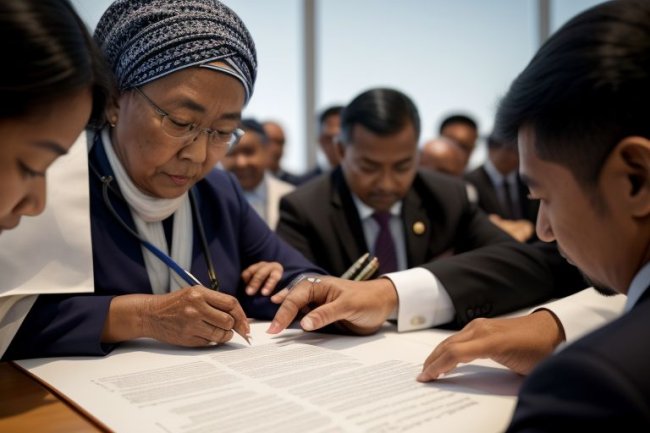The Role Of Spoilers And Vested Interests In Derailing Peace Processes
Across the annals of human history, from ancient civilizations to the modern era, the world has been a stage for countless endeavors to achieve peace through formal agreements and accords. These diplomatic endeavors, borne out of a genuine and impassioned desire to end hostilities, alleviate suffering, and promote stability, have sought to address a diverse array of conflicts spanning the entire spectrum of human discord. From territorial disputes and ethnic tensions to ideological differences and ideological schisms, the pursuit of peace has been an indelible thread woven into the fabric of human civilization.

Peace agreements, as the tangible embodiment of hope and cooperation, have stood as beacons of possibility in even the darkest chapters of human history. They represent the collective aspirations of nations, leaders, and communities to rise above the tumult of war, guided by the unyielding belief in the transformative power of dialogue, empathy, and compromise. Within these meticulously drafted texts and formalized treaties, nations have endeavored to transcend the adversarial shackles of conflict and embrace the prospect of coexistence and prosperity.
Peace agreements that have been effectively implemented have led to transformative results, as demonstrated by notable examples like the peaceful negotiations led by Nelson Mandela that ended apartheid in South Africa and the dismantling of the Berlin Wall, symbolizing the reunification of Germany after years of division. These instances serve as beacons of hope, illuminating the potential that lies within the careful curation of dialogue and negotiation, which can dismantle physical and ideological barriers to pave the way for enduring peace.
However, amid these inspiring successes, history bears witness to many peace agreements that have faltered in their mission to establish lasting tranquility. Despite the best intentions of negotiators and signatories, some of these accords have encountered unforeseen challenges, insurmountable obstacles, and a plethora of complexities that have proven detrimental to their ultimate objective - the attainment of peace.
In dissecting the reasons behind the failures of such agreements, it becomes apparent that the path to lasting peace is far from straightforward. Conflicts, by their very nature, are deeply rooted in historical grievances, power dynamics, and interwoven interests that transcend the mere resolution of surface-level disputes. The involvement of multiple stakeholders further compounds the complexity of conflicts, each pursuing their agendas, making it increasingly difficult to reconcile diverging objectives and arrive at a mutually agreeable settlement.
Additionally, the efficacy of peace agreements often hinges on the inclusivity of the negotiation process, ensuring that all relevant parties are given a seat at the table. The omission of critical stakeholders or marginalized groups from the dialogue can undermine the legitimacy of the accord and result in festering grievances that linger, potentially leading to the resumption of hostilities.
Moreover, the successful implementation of peace agreements relies heavily on robust enforcement mechanisms that hold all parties accountable for their commitments. Weak or absent monitoring and enforcement can breed a climate of impunity, encouraging parties to deviate from the agreed-upon terms, thereby jeopardizing the credibility of the agreement and engendering a sense of distrust among its signatories.
Furthermore, the influence of external actors in the peace process and the broader geopolitical landscape can profoundly impact the success of peace agreements. Powerful nations or interest groups may have vested interests that diverge from the aspirations of those directly involved in the conflict, leading to undue interference and undermining the pursuit of genuine and lasting peace.
Beyond spoilers, vested interests play a crucial role in shaping the dynamics of peace processes. External actors, such as neighboring countries, international organizations, or powerful states, may harbor strategic, economic, or geopolitical interests in the conflict region. These interests can range from securing access to resources, influencing regional power dynamics, or maintaining a strategic foothold.
In some cases, these external actors may support particular parties to the conflict, either overtly or covertly, providing them with resources, arms, or diplomatic backing. Such support can empower certain factions, intensify hostilities, and undermine efforts to foster an impartial and balanced peace process.
Economic interests, particularly in resource-rich conflict zones, can also act as a driver for vested interests and spoilers. Natural resources, such as oil, minerals, or timber, can become lucrative commodities fueling conflict as armed groups or unscrupulous actors exploit them for financial gain. Continuing conflict allows these actors to control and profit from resource extraction or illegal trade, creating disincentives for peace and stability.
Furthermore, vested interests may be intertwined with broader geopolitical rivalries. Conflict regions can become arenas for proxy struggles between powerful states seeking to expand their spheres of influence. These geopolitical maneuvers can exacerbate tensions, deepen divisions, and complicate peace negotiations, as conflicting interests vie for dominance.
The presence of spoilers and vested interests poses formidable challenges to peace processes, often obstructing the path to a negotiated settlement. The use of spoilers and external support might cause the negotiation parties to lose faith in one another, making it challenging to reach an agreement.
Persistent violence and acts of terror may intimidate participants, undermining their willingness to engage in meaningful dialogue or make concessions.
Furthermore, spoilers and vested interests can erode the credibility and legitimacy of peace processes in the eyes of the affected population. As civilians witness ongoing violence and external interference, they may lose faith in the prospect of a peaceful resolution, exacerbating societal divisions and perpetuating the cycle of conflict.
Effectively countering spoilers and vested interests requires a multifaceted and adaptive approach. Some strategies to mitigate their impact include:
· Inclusive Negotiations: Ensuring that all relevant parties have a seat at the negotiating table can reduce the potential for spoilers to exploit exclusion and garner support among marginalized groups.
· Robust Enforcement Mechanisms: Establishing credible mechanisms for monitoring and enforcing the implementation of agreements can deter spoilers from violating the terms of the peace deal.
· Diplomatic Engagement: Engaging with external actors and vested interests through diplomatic channels can encourage cooperation and commitment to the peace process.
· Addressing Root Causes: Addressing the underlying grievances that fuel conflict can reduce the appeal of spoilers and create an environment more conducive to lasting peace.
· Engaging Civil Society: Civil society organizations play a vital role in advocating for peace and countering the influence of spoilers, thereby bolstering public support for the peace process.
The role of spoilers and vested interests in derailing peace processes is a challenging and ever-present reality in the pursuit of lasting peace. Armed militant groups, internal divisions, external actors, and economic interests all wield significant influence, contributing to the complexities of conflict resolution. The disruptive tactics employed by spoilers, coupled with the support they receive, can erode trust and undermine the prospects of successful negotiations. Persistent violence and acts of terror may intimidate participants, undermining their willingness to engage in meaningful dialogue or make concessions.
Learning From Failures To Improve Future Peace Negotiations
Formal peace negotiations and agreements have been instrumental in resolving conflicts and forging pathways toward coexistence and stability. However, the journey toward peace is fraught with challenges, and history has witnessed its fair share of failed peace negotiations and agreements. While such failures can be disheartening, they offer invaluable lessons that, when heeded, can serve as stepping stones towards more effective and enduring peacebuilding efforts.
Understanding the Root Causes of Failure
The first step in learning from failed peace negotiations is a comprehensive understanding of the underlying reasons for their collapse. Conflicts are intricate and multifaceted, often rooted in historical grievances, power imbalances, or deeply entrenched ideological divisions. By analyzing the factors that led to the breakdown of previous negotiations, policymakers and mediators can gain insights into the challenges that must be addressed in future peace processes.
- Inclusivity and Representation:
One of the critical lessons from past failures is the significance of inclusivity in peace negotiations. Excluding key stakeholders, marginalized groups, or factions with genuine grievances can undermine the legitimacy of the process and fuel resentment. Ensuring that all relevant parties have a seat at the negotiating table fosters a sense of ownership and accountability, laying the groundwork for more sustainable and widely accepted agreements.
- Comprehensive and Contextual Solutions:
Peace negotiations must address conflicts' root causes and complex dynamics rather than merely addressing their surface manifestations. Superficial resolutions that fail to tackle underlying grievances are unlikely to withstand the test of time. Crafting comprehensive solutions encompassing the conflict's political, social, economic, and cultural dimensions is crucial for creating a more stable and enduring peace.
- Building Trust and Confidence-Building Measures:
Trust is a fragile commodity in conflict-ridden settings, and building confidence between parties is an essential prerequisite for successful negotiations. Confidence-building measures, such as ceasefires, prisoner exchanges, and humanitarian gestures, can create an atmosphere of goodwill and pave the way for more constructive dialogue.
- Flexible and Adaptive Approaches:
Rigidity in negotiation strategies can hinder progress and alienate parties with diverse interests. Learning from past failures requires flexibility and adaptability, recognizing that peace negotiations are often fluid and subject to unforeseen challenges. Mediators and negotiators must be willing to adjust their strategies in response to changing circumstances and emerging opportunities for progress.
- Addressing Spoilers and Vested Interests:
Spoilers and vested interests, both internal and external, can have a detrimental impact on peace negotiations. Understanding the motivations and tactics of these actors is essential in developing strategies to neutralize their disruptive influence. Countering spoilers requires diplomatic engagement, enforcement mechanisms, and addressing the root causes of their grievances.
- Empowering Civil Society:
Civil society is essential to maintaining peace and can link communities and the parties engaged in negotiations. Peace negotiations may gain from a wider range of viewpoints and encourage more accountability to the interests of impacted communities by empowering civil society groups and supporting their meaningful involvement.
- Timing and Sequencing:
The timing and sequencing of peace negotiations can significantly influence their success. Premature or ill-timed negotiations may lack the conditions for progress, while delay in engaging in dialogue may allow tensions to escalate further. Learning from past failures calls for strategic planning and careful consideration of the timing and sequencing of peace talks.
- The Role of International Mediation:
International mediation can be vital in facilitating peace negotiations, providing neutral ground and expertise in conflict resolution. However, learning from previous experiences also highlights the importance of tailoring mediation efforts to the specific context of the conflict and avoiding undue interference that may undermine the ownership and legitimacy of the peace process.
- Long-Term Commitment:
Peace negotiations are seldom quick fixes, and sustainable peace requires a long-term commitment from all parties involved. Learning from failures underscores the need for sustained engagement, support, and follow-through on implementing agreements.
- Learning from Success Stories:
While learning from failed peace negotiations is crucial, drawing insights from successful peace processes is equally important. Analyzing the factors that contributed to successful resolutions can provide valuable guidance for future negotiations and highlight effective approaches to conflict resolution. The quest for peace and successful peace negotiations are at the heart of humanity's aspirations for a harmonious and stable world. While failures in peace processes can be disheartening, they offer invaluable opportunities for learning and growth.




















